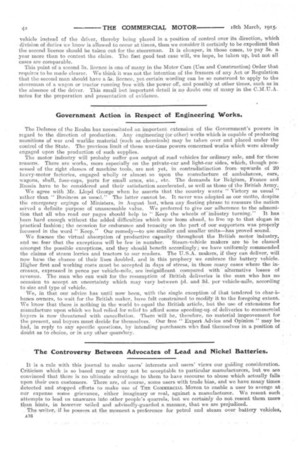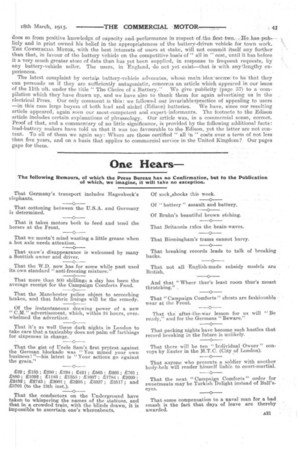The Controversy Between Advocates ol Lead and Nickel Batteries.
Page 2

Page 3

If you've noticed an error in this article please click here to report it so we can fix it.
It is a rule with this journal to make users' interests and users' views our guiding consideration. Criticism which is so based may or may not be acceptable to particular manufacturers, but we are convinced that. there is no ultimate advantage to them to have recourse to abuse. which actually falls • upon their own customers. There are, of course, some users with trade bias, and we have many times . detected and stopped efforts to make use of THE COMMENCIAL 3/10TOR to enable a user to avenge at our expense 'some grievance, either imaginary or real, against a manufacturer_ We resent such , attempts to lead us unawares into other people's quarrels, but we certainly do not resent them more than hints, in however veiled and advisedly-guarded a manner, that we are prejudiced. The.writer,-if he possess at the moment a preference for petrol and steam over battery vehicles, A16 does so from positive knowledge of capacity and-performance in respect of,the first two. ...Ea haspub,— holy and in print owned his belief in the appropriateness of the battery-driven vehicle for town work. THE COMMERCIAL MOTOR, with the best interests of users at stake, will not commit itself any further than that, in favour of the battery vehicle on the competitive basis of" all in ". cost, until it has before it a very much greater store of data than has yet been supplied, in response to frequent requests, by any battery-vehicle seller. The users, in England, do not yet exist—that is with any flengtly experiences.
The latest complaint by certaiji battery-vehicle advocates, whose main ideaaseems' to be that they can persuade us if they are sufficiently antagonistic, concerns an article which appeared in our issue of the 11th tilt, under the title " The Choice of a Battery." We give publicity (page 57) to a -compilation which they have drawn up, and we have also to thank them for again advertising us in the . electrical Press. Our only comment is this: we followed our invariableapractice of appealing to users —in this case large buyeas of both lead and nickel (Edison) batteries. We have, since our resulting article appeared, again seen our most-competent and expert-informants. The footnote to the Edison article includes certain explanations of phraseology. Our article was, in a commercial sense, correct. Proof of that, and a commentary of no little significance, is provided by the following additional facts: lead-battery makers have told us that it was too favourable to the Edison, yet the latter are not content. To all of them we again say: Where are those certified " all ;n " costs over a term of not less than five years, and on a basis that applies to commercial service in the United Kingdom? Our pages gape for them.






















